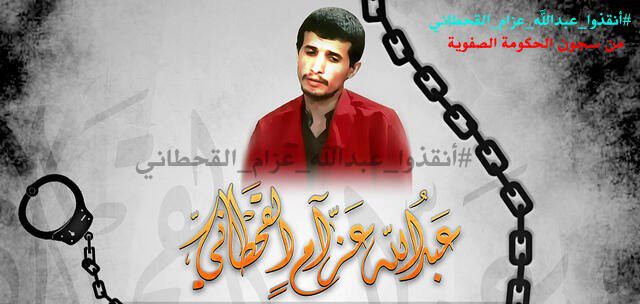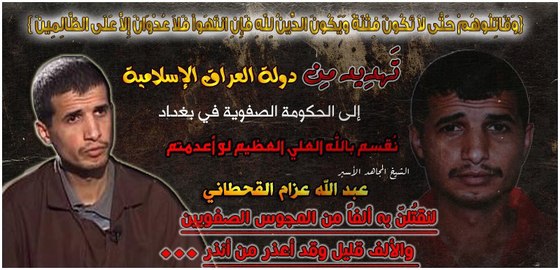The fate of a Saudi who once served as an al Qaeda in Iraq (AQI) leader and proposed a terrorist attack against the 2010 FIFA World Cup in South Africa has garnered significant attention on jihadist social media sites this week.
Abdullah Azzam al Qahtani, who was captured on May 3, 2010, was scheduled to be put to death by Iraqi authorities this week, according to the jihadist sites. Four AQI leaders were put to death on April 1. And jihadists are making online pleas for supporters to pray for al Qahtani.
The banner seen at the top of this article was uploaded to the Facebook page for Al Nusra Media, which regularly publishes material disseminated by Ansar al Sharia Egypt, an al Qaeda-linked group. The banner was also posted on other jihadist sites, including a Facebook page named the Talaba Revolution, which regularly carries propaganda disseminated by another al Qaeda-linked group, Ansar al Sharia Tunisia.
Al Qahtani was first arrested just weeks after AQI's two top leaders were killed on April 18, 2010. AQI emir Abu Ayyub al Masri and the leader of AQI's Islamic State of Iraq, Abu Omar al Baghdadi, were killed during a joint Iraqi-American raid.
According to the Associated Press, authorities found a note authored by al Qahtani at the home where al Masri and al Baghdadi were killed. The note reportedly detailed al Qahtani's nascent plot against the 2010 World Cup.
During an interview with the AP shortly after his arrest, al Qahtani admitted that AQI considered attacking the soccer tournament.
"We discussed the possibility of taking revenge for the insults of the prophet by attacking Denmark and Holland," al Qahtani said. "If we were not able to reach the teams, then we'd target the fans."
Al Qahtani pointed out that the World Cup is an "important event" and he thought it would be easier to strike the Europeans abroad than in their home countries.
AQI considered targeting Danes in response to the publication of cartoons portraying the prophet Mohammed in a negative light. The AP also reported that AQI wanted to attack Dutch citizens "in part due to an anti-Islam film made by right-wing Dutch politician Geert Wilders." Such "perceived insults to Islam" were al Qahtani's stated pretext for AQI's terror plotting abroad.
Al Qahtani's plan appears to have been in the earliest stages of development at the time he was arrested. Iraqi officials noted that AQI had not yet taken any concrete steps, such as acquiring bombmaking components, to move the plot closer to fruition.
Ties to senior al Qaeda leadership
Citing Iraqi officials, the AP added: "The plot still needed approval from the al Qaeda chain of command, specifically second in command, Ayman al Zawahiri." At the time, Zawahiri was the deputy to Osama bin Laden. Zawahiri took over as al Qaeda emir after bin Laden was killed in May 2011.
Iraqi officials directly linked al Qahtani to al Qaeda's central leadership. The Telegraph (UK) published quotes from Major General Qassim Atta, a senior security official in Baghdad, concerning al Qahtani's ties to Ayman al Zawahiri.
Al Qahtani "participated in the planning of a terrorist act in South Africa during the World Cup," Maj Gen Atta said, according to the Telegraph. "He was in contact with the terrorist Ayman al Zawahiri to organize the plan hatched by al Qaeda."
The terrorists al Qahtani served under inside AQI were reportedly in contact with Zawahiri as well.
After al Masri and al Baghdadi were killed in April 2010, Iraqi Prime Minister Nouri Maliki told the press that the AQI leaders had been in contact with both bin Laden and Zawahiri.
"During the operation computers were seized with e-mails and messages to the two biggest terrorists, Osama bin Laden and [his deputy] Ayman al Zawahiri," Maliki said, according to BBC News.
Al Masri was particularly close to Zawahiri, having served under the al Qaeda chieftain since the 1980s, when Zawahiri led the Egyptian Islamic Jihad (EIJ). American officials trumpeted the deaths of AQI's senior leaders, along with other high-profile kills and captures in 2010, as a possible deathblow to AQI.
Since late 2011, however, the group has experienced a resurgence. While falling short of its pre-surge capabilities inside Iraq, AQI has added significantly to its membership rolls and greatly increased its operational tempo. AQI has also spawned a whole new al Qaeda affiliate, the Al Nusrah Front in Syria.
A common cause

Protesting the imprisonment inside Iraq of detainees from around the Middle East and North Africa has become a fairly common cause for online jihadists. Recruits from a number of countries flocked to Iraq during the peak of the war and continue to make their way to Iraq and, even more so, to neighboring Syria today.
Al Qahtani reportedly first traveled to Iraq in 2004 and worked his way up AQI's hierarchy, becoming a leader for the terrorist organization in Baghdad prior to his arrest. While al Qahtani's plot against the World Cup never got off the ground, Iraqi officials say he was responsible for a string of attacks inside Iraq's capital prior to his arrest.
Today, al Qahtani's cause is championed in the jihadists' online world. The banner shown above was published on a Facebook news page for Ansar al Sharia Tunisia, an organization that regularly honors "martyrs" who have died in Iraq and Syria. In its Facebook post, the group says al Qahtani went on a hunger strike to protest his confinement and tells supporters not to be stingy with their prayers in his honor.




















